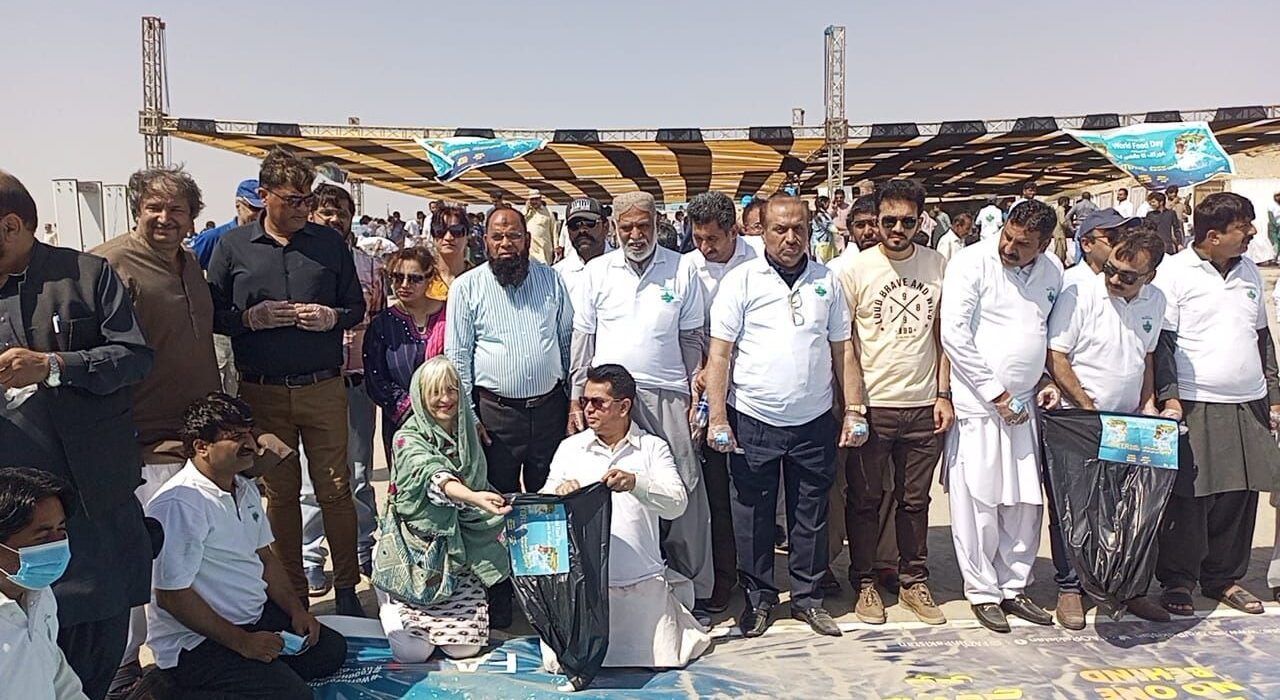Jamshoro (Kashif Shamim Siddiqui): On the occasion of World Food Day, which carried the theme “Water is Life, Water is Food. Leave no one behind,” the Food and Agriculture Organization of the United Nations (FAO), in collaboration with the government, the World Food Programme (WFP), the International Fund for Agriculture Development (IFAD), the United Nations Children’s Fund (UNICEF), and Oxfam GB, organized a cleanup along the River Indus near Kotri, Jamshoro in Sindh. This event saw the active participation of more than 500 individuals, including representatives from universities, UN agencies, non-governmental organizations, government departments, and the farming community, who gathered to collect and safely dispose of debris, shedding light on the critical role of clean water in agriculture and overall well-being.
World Food Day, an annual celebration, serves as a platform for advocating the transformation of food systems. This year’s chosen theme underscores the pivotal significance of water in agriculture and the welfare of communities. It aligns with the Living Indus Initiative, a partnership between the Government of Pakistan and UN agencies aimed at addressing ecological well-being in the Indus River Basin amidst the challenges posed by climate change.
On this World Food Day, FAO Pakistan, in collaboration with the government and other UN agencies operating in Pakistan, is launching the “Clean Indus” campaign, which places a primary focus on water conservation and enhancing water quality to boost food production. The campaign’s goal is to raise awareness and inspire action to safeguard the Indus River.
During the event, Haji Khan Jamali, Chief Engineer of Sindh, Asadullah Khoso, Assistant Deputy Commissioner of Jamshoro, and Agha Fakher, Director General of Food Authority Sindh, stressed the importance of water in agriculture, food production, and food security. They highlighted the rapid depletion of irrigation resources and the need for restoration and maintenance to secure the future generation’s water needs.
Representatives from the farming community, including Zulfiqar Ali Kachelo and Naghma Naz, shared the challenges faced by farmers and emphasized the critical role of water. They underscored that while fertilizers and nutrients are essential for their fields, water is indispensable for their survival.
Florence Rolle, FAO Representative in Pakistan, highlighted the country’s agricultural significance, with its extensive irrigated land making it the world’s third-largest in this category. This underscores the relevance of the “Clean Indus” initiative in Pakistan.
The Indus River, a cultural and economic cornerstone of Pakistan, confronts issues such as glacier melting and pollution. FAO’s “Clean Indus” campaign aims to raise awareness and foster collaborative action, emphasizing the potential for ecosystem restoration, and drawing inspiration from success stories in other nations.
WFP Country Director Coco Ushiyama emphasized the crucial role of water in life and the impacts of climate change and pollution. The World Food Programme is lending its support to the Clean Indus Drive, aimed at restoring the Indus Basin ecosystem, ensuring access to water sources, and enhancing food security.
According to a 2023 UN report, Pakistan ranks among the 36 most water-stressed nations. Fernanda Thomaz da Rocha, IFAD Pakistan Country Director, called for prudent water management, efficient food production, equitable water distribution, and the preservation of aquatic food systems. Syed Shahnawaz Ali, Oxfam in Pakistan’s Country Director, stressed the importance of water in the context of the climate crisis and the need for collaborative efforts across various sectors.
Abdullah Fadil, UNICEF Representative in Pakistan, emphasized the interconnection between child malnutrition and access to safe drinking water. Given Pakistan’s growing population and the increasing pressure on water and food resources, safeguarding these resources is paramount for addressing malnutrition and ensuring the health and cognitive development of children.
Upon the event’s conclusion, the FAO representative conveyed that comparable initiatives had been undertaken in every province of Pakistan to enhance public understanding regarding the critical significance of water in supporting human survival.













